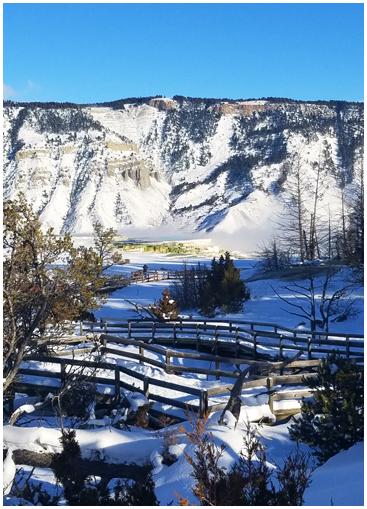
The Terraces |
JUST GOT BACK FROM...
YELLOWSTONE NATIONAL PARK
By Cindy Ferguson
Living in Southern California in the middle of winter, I thought to myself, "where can we go for the 2018 New Year weekend that offers adventure, great sightseeing and is not too far away?" We have been to Mexico, Hawaii, and have packed up the car and driven to Napa, Sequoia and Yosemite. I LOVE them all, but we were looking for something a little different. Yellowstone National Park came to mind, but one does not think about Yellowstone for a vacation in the dead of winter. Or, do they? I did a little research and found that even though Yellowstone was covered in snow, and it was COLD (below zero), it was a magical winter wonderland in the freezing, snowy months.
Let's go!
Cold it was, minus 3 and snowing upon our arrival. But we were bundled up and ready for adventure. We stayed at the Mammoth Hot Springs Hotel which is one of only two hotels open in Mammoth during the winter months. Mammoth Hot Springs Hotel is located near the North Entrance and is open from December to March. We flew into Bozeman Airport and took a shuttle to the hotel. After we settled in, we went downstairs and lined up for our first tour via a huge snow coach. These giant off-road vehicles boast panoramic side windows, oversized tires — about 4-feet-tall and 3-feet-wide - enabling travel in a landscape where seasonal snowfall can total up to 600 inches, and snowpack can reach as much as 10 feet above the roadways’ surface.
|
|
Over the next several days we took 3 guided tours to see wildlife, fumaroles, boiling hot springs and geysers, and colorful, bubbling mud pots. We were not disappointed! Throughout the winter season, the park becomes a 2 million acre smorgasbord of incredible sights, sounds and interesting smells (the sulfur aroma is memorable)! We also took one self-guided walking tour through the Terraces, which are very near the hotel. Mammoth Hot Springs hotel has two terrace boardwalks, the Upper and Lower. Approximately 50 hot springs lie within the area. Each tour offered a spectacular, diverse scenery.
The vast contrast between the aqua and copper bubbling Mud Pots against the pure white snow is stunning. Mud Pots are created where hot water is limited and hydrogen sulfide gas is present (emitting the rotten egg smell), and sulfuric acid is then generated. The acid dissolves the surrounding rock into fine particles of silica and clay that mix with what little water there is to form the sizzling, bubbling and sometimes very colorful mud pots. The sights, sounds, and smells of areas like Artist and Fountain paint pots and Mud Volcano make these thermal features some of the most memorable in the park.
|
|
|
Steamy thermal features, cold winter temperatures, and bison trudging through the snow equal
a wonderland unimaginable to anyone not familiar to Yellowstone in the winter.
|
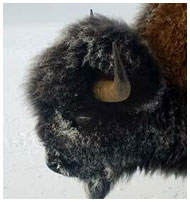
Yellowstone Bison
|
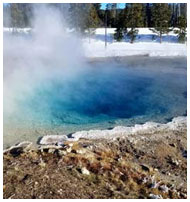
Bubbling Aqua Mud Pot!
|
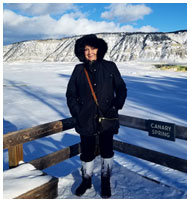
Cindy at the Terraces
|
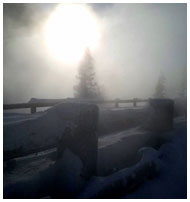
Sunrise through Geyser Fog
|
|
Yellowstone offers a dizzying array of wildlife, from survival-focused bison nuzzling through the snow pack in search of a buried treat and towering moose strolling across the plains, to feisty red wolves pouncing into the deep snow pack in search of an ever-eluding meal. Visitors are rewarded with an experience like few other places on Earth. Bison have it pretty rough in the winter. These massive creatures spend their winters foraging for food beneath the snow, and they can sometimes be seen with large clumps of snow and ice dangling from their chin fur (like the guy in our photo who decided to stroll right next to our snow coach and STOPPED directly to my left for a short visit!). Oddly shaped “snow beards” dangle precariously from a bison’s jaw until the weight forces them to break off, sometimes taking fur with them.
|
|
|
|
One area not to miss is Dragon's Mouth, a turbulent hot spring with a cavernous, gaping mouth. Within the cavern, water sloshes in and out, and as hot water rises to the surface, hydrogen sulfide, carbon dioxide and water vapor gases expand, creating a pressure explosion inside of the cavern. The results are sounds of sloshing, belching, sizzling, grunting and spitting. The temperature is 170.2F. Dimensions are 18x30 feet, and a depth of 16 feet.
|
|
During periods of extreme cold, rime from hydrothermal mist accumulates on the branches of trees. When combined with falling snow, trees take on an eerie appearance and are known as “ghost trees.”
When the conditions are just right, visitors will see light-reflecting ice crystals floating in the air, giving the illusion of a crystalline fog. As the crystals drift through the air, they become breathtaking tiny, glistening sun catchers as they reflect the sun’s rays.
|
|
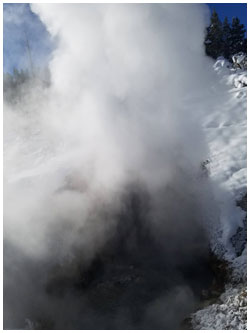
Dragon's Mouth
|
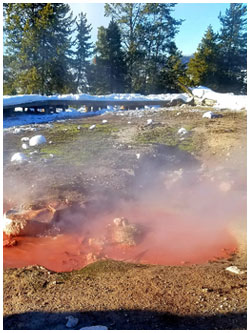
Orange Mud Pot
|
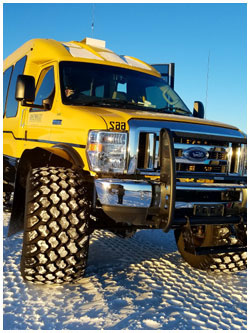
Snow Coach
|
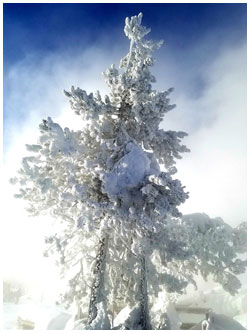
Ghost Tree
|
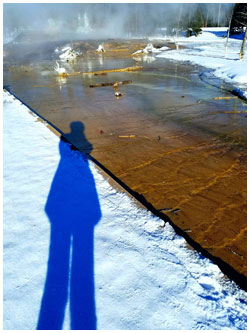
Cindy at the Fountain Paint Pot
|
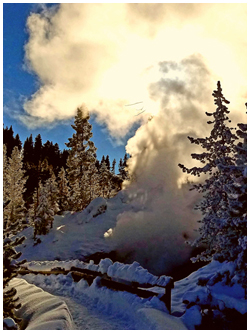
Yellowstone Thermal
|
Yellowstone in the winter? Yes, definitely!
I can't wait to go back.
|
|
|
|